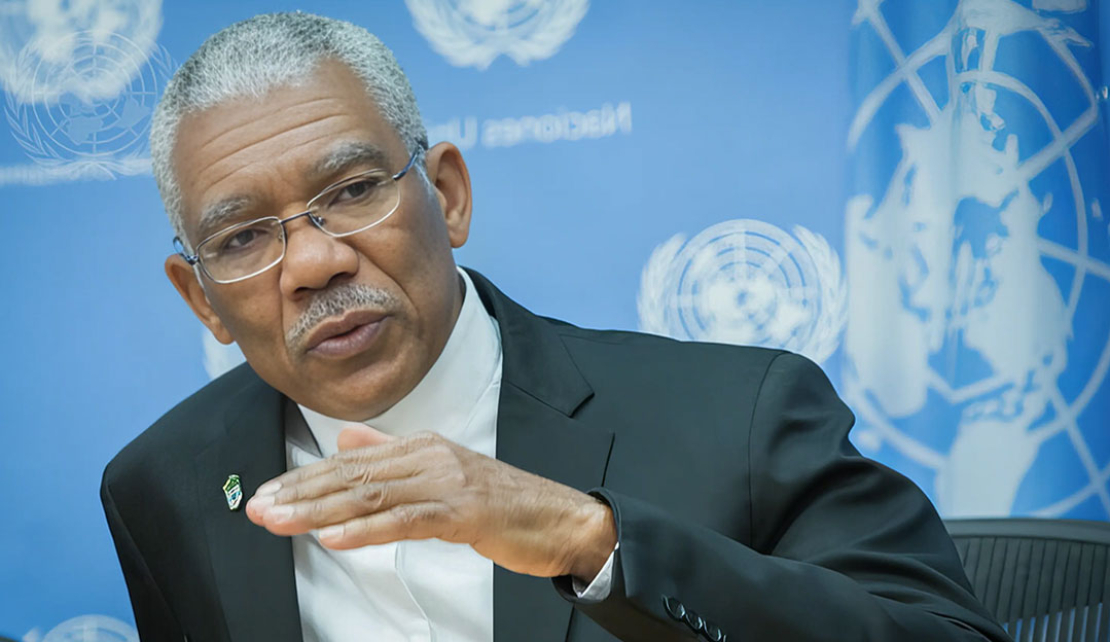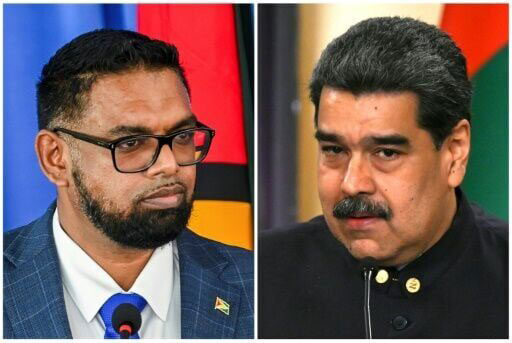GUYANA | Keep all eyes Peeled on Miraflores Palace in Venezuela says David Granger

GEORGETOWN, Guyana, December 17, 2023 - Former President David Granger has shed light on the persistent territorial claims of Venezuela over five of Guyana's ten regions, a controversy that has spanned six decades.
In a detailed exposition on his weekly programme – The Public Interest – Mr. Granger attributed this unrelenting stance to the mindset entrenched in Miraflores Palace, the office and residence of Venezuelan Presidents.
The genesis of this enduring conflict dates back to 1962, initiated by then Venezuelan President Rómulo Betancourt. As Granger explains, this was a period marked by heightened tensions in the region, with a Cuban-backed Castroite guerilla insurgency posing threats to Venezuela.
During this turbulent era, Venezuela harbored significant American corporate investments in minerals and petroleum, making it a focal point of U.S. interests in South America.
This geopolitical landscape was further complicated by the visit of US President John F. Kennedy in December 1961, aiming to mitigate Cuba's influence and safeguard these investments under the Alliance for Progress initiative.
Miraflores' approach to the Guyanese frontier was manifested starkly in November 1962, just eleven months after Kennedy's visit. Under the People's Progressive Party (PPP) administration, the Venezuelan government denounced the Arbitral Award of 1899 before the UN Special Committee on Decolonisation.

The bilateral approach adopted by Miraflores has been characterized by a mix of commercial incentives and military aggression. Central to Venezuela's foreign policy in the region has been the Bolivarian Alliance for the Americas (ALBA), as highlighted by Granger.
This alliance, drawing influence from concessionary petroleum supplies, constitutes a significant portion of the Venezuelan government's income. Over the years, ALBA has expanded to include nations such as Antigua and Barbuda, Bolivia, Cuba, Dominica, Nicaragua, St. Lucia, and St Vincent and the Grenadines.
According to Granger, this expansion has not only amplified Venezuela's diplomatic and economic leverage but also complicated the understanding of Guyana's territorial plight over the past two decades.
The history of provocations from Miraflores is long and varied, as outlined by the former President. From the presidency of Raúl Leoni, who issued a decree in 1968 annexing parts of Guyanese territory, to the more recent administrations of Hugo Chávez and Nicolás Maduro, Venezuela's posture towards Guyana has been consistently aggressive.
Notably, Chávez openly challenged Guyana's sovereignty, particularly over plans to establish a satellite station in the Barima-Waini Region. Maduro's tenure has seen further escalation, with multiple decrees attempting to appropriate portions of Guyana's Exclusive Economic Zone, accompanied by violations of Guyanese air, land, and sea spaces, including the notable incidents involving the Teknik Perdana in 2013 and the Ramform Tethys in 2018.
In response to these ongoing tensions, Granger advocates for a multifaceted approach to reinforce Guyana's position.
He calls for the strengthening of defense and militia forces, particularly in frontier villages where residents face harassment. Moreover, he emphasizes the need for Guyana to bolster its relations with international organizations, enhance parliamentary cooperation on foreign relations, and intensify public education campaigns about the territorial controversy.
Granger's message is clear: Guyana must remain eternally vigilant of the strategies and stratagems emanating from Miraflores.
This vigilant stance advocated by Granger is not just a response to a series of historical events but a strategic necessity in the face of a complex geopolitical landscape. The former President's recommendations come at a time when Guyana is navigating its path as a relatively new oil-producing nation, adding another layer of complexity to its interactions with neighboring Venezuela.
The oil discoveries have catapulted Guyana into the global energy spotlight, making the resolution of this territorial dispute even more crucial for its national security and economic stability.
Granger's emphasis on strengthening defense capabilities underscores the gravity of the situation. By reinforcing its military presence in vulnerable frontier areas, Guyana not only protects its citizens from potential harassment but also sends a clear message of its commitment to safeguarding its territorial integrity.
The deployment of defense and militia forces is a tangible step towards deterring any aggressive overtures from Venezuela.
Equally important is Granger's call for enhanced diplomatic engagement and international support. By forging stronger ties with global organizations and rallying parliamentary support, Guyana can amplify its voice on the international stage.
This diplomatic strategy aims to garner wider understanding and support for Guyana's position, countering the narrative pushed by Venezuela through its alliances.
Furthermore, Granger’s focus on public education about the territorial dispute is a vital aspect of building national resilience. By ensuring that the Guyanese people are well-informed about the historical and current dimensions of the conflict, the government fosters a sense of national unity and preparedness. Such awareness is crucial in a context where national sovereignty and territorial integrity are under persistent challenge.
In conclusion, the unwavering stance of the Venezuelan government, as reflected in the actions and policies emanating from Miraflores Palace, presents a complex and enduring challenge for Guyana. Former President Granger's analysis and recommendations offer a roadmap for Guyana to navigate this challenge.
As Guyana continues to assert its sovereignty and seeks peaceful resolutions within international legal frameworks, the vigilance and strategic actions outlined by Granger will remain pivotal in safeguarding its national interests and territorial integrity.
-30-
